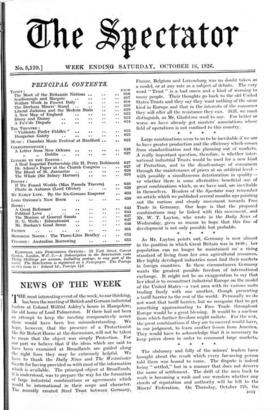As Mr. Layton points out, Germany is now almost in
the position in which Great Britain was in 1840 ; her population can no longer be maintained on a rising standard of living from her own agricultural resources. Her highly developed industries must find their markets in foreign countries. In these circumstances Germany wants the greatest possible freedom of international exchange. It might not be an exaggeration to say that her ideal is to reconstruct industrial Europe on the model of the United States—a vast area with its various units trading freely with one another, though presenting. a tariff barrier to the rest of the world. Personally we do not want that tariff barrier, but we recognize that to get something approximating to Free Trade throughout Europe would be a great blessing. It would he a nucleus from which further freedom might radiate. For the rest, the great combinations if they arc to succeed would have, in our judgment, to learn another lesson from America. They would have to acknowledge that it is necessary to keep prices down in order to command large markets.'






















































